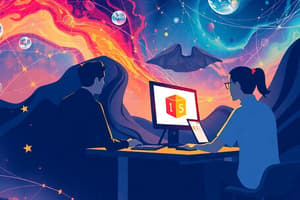Podcast
Questions and Answers
What is computer-mediated communication (CMC)?
What is computer-mediated communication (CMC)?
- Communication that is solely verbal
- Face-to-face communication
- The exchange of messages through various media
- The exchange of messages through a system of digital electronic storage (correct)
What does the media deficit approach suggest?
What does the media deficit approach suggest?
Mediated communication is deficient compared to face-to-face communication.
What does the media augmentation approach view mediated communication as?
What does the media augmentation approach view mediated communication as?
Complementing or augmenting face-to-face communication.
Define social presence.
Define social presence.
What is media richness?
What is media richness?
What are emotions in the context of digital communication?
What are emotions in the context of digital communication?
What is asynchronicity?
What is asynchronicity?
What is spam?
What is spam?
Define phishing.
Define phishing.
What does spoofing mean?
What does spoofing mean?
What is pseudoanonymity?
What is pseudoanonymity?
What is an avatar?
What is an avatar?
Define the field of availables.
Define the field of availables.
What are hyperpersonal relationships?
What are hyperpersonal relationships?
What is cultural capital?
What is cultural capital?
Define technocapital.
Define technocapital.
What is the diffusion of innovations?
What is the diffusion of innovations?
Flashcards are hidden until you start studying
Study Notes
Computer-Mediated Communication (CMC)
- CMC refers to the exchange of messages transmitted between two or more individuals through digital electronic systems.
- It encompasses various forms of communication, including email, messaging apps, and social media platforms.
Media Deficit Approach
- This perspective posits that mediated communication lacks the richness and immediacy of face-to-face interaction.
- Argues that non-verbal cues and emotional depth are diminished in CMC.
Media Augmentation Approach
- Contrasts the deficit approach by viewing CMC as an enhancement or complement to in-person communication.
- Suggests that digital interaction can facilitate deeper connections and communication effectiveness.
Social Presence
- Refers to the sense of psychological closeness created by different communication media.
- Affects how individuals perceive their interactions and emotional engagements online.
Media Richness
- Describes the capacity of a communication medium to convey information effectively.
- Richer media can transmit multiple cues and provide clearer context, improving understanding.
Emotions
- Pictographs or emoticons used in digital communication help convey emotional tone and relational information.
- Enhance clarity and emotional expression in text-based conversations.
Asynchronicity
- Occurs when messages are sent and received at different times, allowing for delay and reflection in responses.
- Can lead to more thoughtful communication but may also result in misunderstandings.
Spam
- Refers to unsolicited commercial messages sent via email, often intended for advertising.
- Represents a significant issue in digital communication, leading to clutter and distraction.
Phishing
- A form of online deception that aims to acquire sensitive information like banking or credit card details fraudulently.
- Commonly executed through convincing fake emails that mimic legitimate sources.
Spoofing
- Involves misrepresenting oneself online, often for malicious purposes.
- Can lead to identity theft and security breaches in digital spaces.
Pseudoanonymity
- The act of projecting a false identity online, often to engage without personal accountability.
- Can facilitate free expression but may also foster deceptive behaviors.
Avatar
- A digital representation of a user in virtual environments, serving as an extension of their identity.
- Avatars can be customized to express individual personality and creativity.
Field of Availables
- Refers to the broader range of potential friends and partners accessible through CMC compared to face-to-face interactions.
- Encourages networking and diverse social connections beyond geographic constraints.
Hyperpersonal Relationships
- These are intimate connections that form more rapidly through online interaction than in-person relationships.
- Often characterized by heightened self-disclosure and idealized perceptions of others.
Cultural Capital
- Represents the knowledge and competencies required to navigate social dynamics effectively.
- Influences an individual's ability to connect and communicate in diverse environments.
Technocapital
- Encompasses access to digital skills and technological resources necessary for effective participation in the modern world.
- Equips individuals to leverage technology for communication and engagement.
Diffusion of Innovations
- A theory that explores how and why certain technological advancements, such as computers and internet technology, are embraced by some individuals while rejected by others.
- Factors like peer influence, perceived usefulness, and compatibility play roles in this process.
Studying That Suits You
Use AI to generate personalized quizzes and flashcards to suit your learning preferences.




